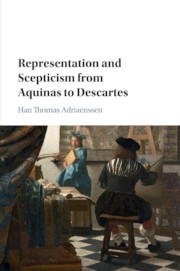Book contents
- Frontmatter
- Contents
- Acknowledgements
- List of Abbreviations
- Introduction
- PART I THE VEIL OF SPECIES
- PART II THE VEIL OF CARTESIAN IDEAS
- 4 Transformations of Cartesianism: Malebranche and Arnauld
- 5 Ideas and Objects in Desgabets's Radical Cartesianism
- 6 The Solid Philosophy of John Sergeant
- PART III REPRESENTATIONS AND SCEPTICISM
- Conclusion
- Bibliography
- Index
4 - Transformations of Cartesianism: Malebranche and Arnauld
from PART II - THE VEIL OF CARTESIAN IDEAS
Published online by Cambridge University Press: 13 July 2017
- Frontmatter
- Contents
- Acknowledgements
- List of Abbreviations
- Introduction
- PART I THE VEIL OF SPECIES
- PART II THE VEIL OF CARTESIAN IDEAS
- 4 Transformations of Cartesianism: Malebranche and Arnauld
- 5 Ideas and Objects in Desgabets's Radical Cartesianism
- 6 The Solid Philosophy of John Sergeant
- PART III REPRESENTATIONS AND SCEPTICISM
- Conclusion
- Bibliography
- Index
Summary
Before addressing the reception of Descartes's philosophy by his readers and critics in the seventeenth century, something first needs to be said about the Cartesian way of ideas itself. Much like Descartes's contemporaries, his modern commentators are split over the status and function of ideas. According to some, Cartesian ideas are just acts of the mind that direct us to the external things in our environments. Others, however, read Descartes as saying that we indirectly perceive objects in virtue of perceiving our own ideas. In these scholarly debates, the problems that philosophers such as Reid raised for the way of ideas in the eighteenth century, are never far away. On Reid's interpretation of Descartes, since we only see external objects in their ideas, we never really get to see the real things outside of our minds. This classical line of criticism has proven to be a major source of inspiration for direct-realist interpretations of Descartes.
In section 4.1 of this chapter, I will re-examine some of the passages from the Meditations that are most often adduced in virtue of reading Descartes as an indirect realist. I will argue that, although they at first may give the impression that it is via the perception of our ideas that we indirectly perceive external objects, on closer inspection, the texts do not support this reading. Moreover, I will argue that Cartesian ideas are just not the kind of things that could block our cognitive access to the things themselves. On the contrary, there is a real sense in which for a Cartesian mind to turn to its idea of the sun is for that mind to have the sun itself present to it. The fear that Descartes's philosophy of ideas will interpose an opaque veil of intermediaries between us and the world, then, needs to be mitigated. To appreciate why this is the case, a number of key distinctions and concepts that Descartes introduces in outlining his theory of ideas need to be clarified, and this is what the lion's share of section 4.1 will be dedicated to.
- Type
- Chapter
- Information
- Representation and Scepticism from Aquinas to Descartes , pp. 125 - 168Publisher: Cambridge University PressPrint publication year: 2017



